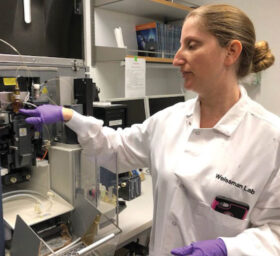Distinguished Speaker Series Transcript
 “I want to leave you with hope. I think we’re going to be unstoppable because I think that these are solvable problems. These are answerable questions. I think that there are already a lot of existing tools in immunology that just need to be brought into the fight, and we can change this.”
“I want to leave you with hope. I think we’re going to be unstoppable because I think that these are solvable problems. These are answerable questions. I think that there are already a lot of existing tools in immunology that just need to be brought into the fight, and we can change this.”
– Michal Caspi Tal, PhD
Michal Caspi Tal: In the chronic illness world, I think that there is something about hope with a capital ‘H’ that is precious. I think it always has to be. I want to talk a little bit about what my lab is doing, where I think we could go in the future and the hope that I have for how we move forward, how we solve this, and how we change this for those who come after us. So, I’ll tell you a little bit about some of the recent things that have come out of the lab, what the lab is working on now, and where we want to go.
New Study Shows How Borrelia burgdorferi Evades the Immune System
Recently, we published a study in collaboration with Hanna Ollila’s lab where we compared people who’ve had Lyme and have had a diagnosis of Lyme versus people who’ve never had a diagnosis of Lyme. We found a genetic difference in a sweat protein that nobody—including me—had ever thought about before. We tested it against the bacteria in our lab, and we saw that it had a huge effect; we tested it in mice, and it had a huge effect. So that’s really exciting. We had another paper that came online yesterday that is one of these last papers from my postdoctoral work over at Stanford, where we actually managed to figure out some of how Borrelia burgdorferi, the bacteria that causes Lyme, manages to evade immune clearance.
 Any respectable pathogen that can establish a persistent infection needs to figure out your immune system to the point that it can evade it. The fact that it has persisted means that it was able to evade your immune clearance. And so, I got to that from a very interesting direction working on immune regulation, trying to understand these brakes on the immune response and how they impact the response to infection. The immune system has the power to kill you and obviously, nobody has any incentive for that to happen. So, there are a lot of mechanisms in place to put brakes on the immune system and reign it in. One of the huge developments in cancer over the last two decades has been reevaluating the question: can we take those brakes off? So in my postdoc, I was studying a particular checkpoint where this was turning into an exciting immuno-oncology target, and I said, ‘I want to look at how this checkpoint is used in infection.’ I realized that this checkpoint was being used to help you survive an acute infection, but created a vulnerability for pathogens to evade immune clearance and establish chronic infection much like it allows cancer cells to evade immune clearance. In an amazing collaboration with Irv Weissman, Balyn Zaro, and Jenifer Coburn we realized that the bacteria that cause Lyme disease manipulate this brake and that’s how I became fascinated with Lyme. But I also became concerned about turning off this brake in cancer patients because I was concerned about what would happen if you used this on cancer patients during an active infection. Indeed, the clinical trials on this drug were ended due to increased death from infection, and I wish it hadn’t been tested during a worldwide pandemic.
Any respectable pathogen that can establish a persistent infection needs to figure out your immune system to the point that it can evade it. The fact that it has persisted means that it was able to evade your immune clearance. And so, I got to that from a very interesting direction working on immune regulation, trying to understand these brakes on the immune response and how they impact the response to infection. The immune system has the power to kill you and obviously, nobody has any incentive for that to happen. So, there are a lot of mechanisms in place to put brakes on the immune system and reign it in. One of the huge developments in cancer over the last two decades has been reevaluating the question: can we take those brakes off? So in my postdoc, I was studying a particular checkpoint where this was turning into an exciting immuno-oncology target, and I said, ‘I want to look at how this checkpoint is used in infection.’ I realized that this checkpoint was being used to help you survive an acute infection, but created a vulnerability for pathogens to evade immune clearance and establish chronic infection much like it allows cancer cells to evade immune clearance. In an amazing collaboration with Irv Weissman, Balyn Zaro, and Jenifer Coburn we realized that the bacteria that cause Lyme disease manipulate this brake and that’s how I became fascinated with Lyme. But I also became concerned about turning off this brake in cancer patients because I was concerned about what would happen if you used this on cancer patients during an active infection. Indeed, the clinical trials on this drug were ended due to increased death from infection, and I wish it hadn’t been tested during a worldwide pandemic.

